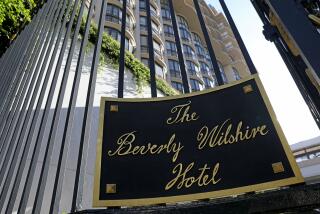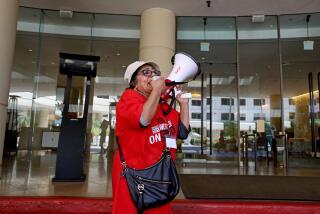U.S. Ousts Keating, Aides From Control of 2 Luxury Hotels
WASHINGTON — Federal regulators Thursday ousted Lincoln Savings & Loan owner Charles H. Keating Jr. and more than two dozen of his associates from management of two troubled Arizona hotels partly owned by the failed Irvine thrift.
More than 60 regulators, lawyers, federal marshals and locksmiths walked into the posh Phoenician Resort in Scottsdale and the Crescent Hotel in downtown Phoenix at 1:30 a.m. to seize control of the lodges.
Regulators seized Lincoln on April 14, a day after its parent company filed for bankruptcy protection. It will cost taxpayers as much as $2 billion to bail out the insolvent institution, making it the largest thrift failure on record.
Lincoln invested a total of $324 million in the two hotels, which are among its major problem assets. The government will continue to operate the hotels, along with Lincoln, until it can find buyers for the assets.
Lincoln, through a subsidiary, owns 55% of the Phoenician, a luxury lodge nestled at the foot of the Saddleback Mountains, and the Crescent, an upscale hotel for business executives. The Kuwait Investment Office, an investment firm, owns the remaining 45%.
Keating had retained control of the hotels even after regulators seized Lincoln because a contract with the Kuwaiti investors required a 75% vote to change management. Until Thursday, Keating had been able to keep the Kuwaitis on his side, thwarting government attempts to remove him.
Regulators had been wooing the foreign investors since April to join with them in ousting Keating.
In seizing the hotels, regulators threw out as many as 30 employees and managers, including Keating, his wife and other family members. Others removed were Michael Kelly and Robert J. Hubbard Jr., general managers of the Phoenician and the Crescent, respectively. Hubbard also is a son-in-law of Keating.
Some of the fired executives learned about their dismissals through notes taped to the doors of their homes at 2 a.m. A handful of people, wearing large brown and yellow buttons declaring, “I Like Charlie Keating,” gathered at the Phoenician at 3 a.m. to find out why they were let go.
The takeover surprised and angered American Continental officials, said Bradley J. Boland, another Keating son-in-law and corporate spokesman.
“The Gestapo came in and took over,” Boland said. “These guys don’t know which side of the Berlin Wall they’re on.”
Boland characterized the seizure as “a blatant act of terrorism” on the part of federal regulators.
“They locked up doors,” he said. “They locked up offices. Then they sent an army out to post severence notices on doors of employees they were firing. They cut out the major portion of the senior management that ran and made the resort the most successful resort anywhere in the country. They ruined it today.”
Last month, Boland said, the resort’s gross revenues were more than $4.3 million, and the Phoenician had become a “magnet” for Arizona’s economic recovery.
Resolution Trust Corp., a new federal agency created to operate failed thrifts, said it had hired Hans D. Turnovszky to manage the two hotels. Turnovszky is a 25-year veteran of the hotel industry, the agency said.
The hotels were high on the list of risky investments identified by regulators in their examinations of Lincoln.
Lincoln invested $296 million in the Phoenician. Cost overruns and other expenses ran so high that federal examiners determined that the resort would lose money even if it were fully occupied. The resort currently is about 95% occupied, regulators said.
Built on 130 acres, the Phoenician consists of 474 hotel rooms, 131 cottages, a 22,000-square-foot ballroom, 21 meeting rooms, six restaurants, a golf course, 10 lighted tennis courts, a health club and an acre of pools set on three tiers, each with different water temperatures. Its restaurants include Mary Elaine’s, named after Keating’s wife, and Charlie Charlie’s, named after Keating.
Lincoln invested $28 million in the Crescent. Last year, regulators said that the hotel had incurred a $5.2-million operating deficit since it opened in 1986.
Steve Webb, a free-lance writer in Phoenix, contributed to this report.
More to Read
Inside the business of entertainment
The Wide Shot brings you news, analysis and insights on everything from streaming wars to production — and what it all means for the future.
You may occasionally receive promotional content from the Los Angeles Times.










